It looks like you're using an Ad Blocker.
Please white-list or disable AboveTopSecret.com in your ad-blocking tool.
Thank you.
Some features of ATS will be disabled while you continue to use an ad-blocker.
share:
After studying the culture and history of my country, Wales, for over 30 years, I have come to the conclusion that mainstream archaeology in the UK is
suppressing the true history of this country. Why? I couldn't say, but maybe it goes back to when it was thought best to restrict nationalist
feelings among the Welsh to stop them revolting, like outlawing their language and restricting their knowledge of their own history. Welsh history is
still not taught in schools in Wales, we are taught the kings and queens of England, even though 90% of them had nothing to do with wales. We had
kings and princes long before England even existed.
DNA research done in the last few years of haplogroup R1b has shown that the Welsh are the only remnants of the original inhabitants of Britain and our DNA is genetically distinct from the rest of the UK. The DNA evidence proves that as a people we were never conquered as there is very little outside interaction with us. This means no roman, no Viking, no Saxon or Norman, no beaker people and certainly no lost tribe of Israel in their genetic makeup. Even the Welsh language is proof of not being conquered, if you can speak and read welsh then you would have no trouble understanding someone speaking Old Welsh from over a thousand years ago. How many other languages can you do this with?
So why do British archaeologists feel the need to invent groups of people to explain their research? Like the beaker people and other theoretical peoples? It feels like they don't believe the Welsh were capable of making the advances in technology that have been found in Britain.
At one time the lands of the Welsh covered the whole of Britain, from Scotland to Cornwall. There is evidence of the original people of the island; in what is now called Wales, stretching back over 40,000 years. The oldest human burial in the UK was found in wales. The Red Lady of Paviland is a skeleton found in the Gower area of Wales buried in a cave. The skeleton was originally thought to be a woman, because of the grave goods, but later tests have shown it was a man. It gets its name from the fact it was covered with red ochre before being buried. The skeleton was found with what has been identified as wands and bracelets of ivory, along with a mammoth’s skull. The goods suggest someone of status and probably some type of religious person, maybe a priest. Ornamentation on the grave goods has dated this burial to before the last period of glaciation, i.e. 25,000 BC. They were able to bury their dead within a religious context, with ornamented goods, yet they are not capable of making a beaker with a few lines on it?
So this is my attempt to unravel the lies fed to us by the archaeologists of Britain. starting with the stones of Wales.
All over the UK there are standing stones, stone circles, tombs and chambers. All attest to the knowledge and skill of the original inhabitants of this island. It stands to reason that if the original inhabitants of the island were the Welsh, then they made them, not some imaginary people who came from elsewhere.
Take Stonehenge as an example, one of the best feats of engineering undertaken by the ancient inhabitants of Britain. It is well known that the blue stones came from south wales. It is also thought that the stones were probably in use in Wales before being transported to their present site. Now British archaeology will have you believe that some mysterious people went to wales, took the stones and transported them across wales, across what is now England and erected them where they now stand, all without even the smallest reaction by the welsh they belonged to. Really? The Welsh just let them take stones that were so special to them they transported them across Britain to Stonehenge and erected them by hand? Complete rubbish. It would be like the French buying Stonehenge now and coming over and saying they were now going to take it down and transport it back to France. It wouldn't happen, and the stones mean nothing to us now.
Do you really think that the most violent and war ready tribes in the whole of Britain at that time would allow that to happen? The tribes of South Wales were so vicious and violent that they were never defeated in battle and the most powerful kings, princes and warlords in Britain came from this area. The romans only ever invaded north wales properly, they never dared to invade south wales, and they held the local tribe in the area I live, The Silures, with the highest respect because of their ferocity and were the only tribe named in their annals. They had small outposts and marching camps but nothing major further into south wales than Caerleon. The Vikings only attacked the south coast of what is now wales once, they were defeated. Not even the English kings with their powerful armies could defeat them, south wales was the only part of wales left to the Welsh princes to rule, as they were the only ones who could control the tribes living in the area. It costs less lives, money and time to assimilate than to conquer.
Yet you want me to believe the stones were taken without a fight? This only leaves the possibility that it was the Welsh who took them there. There are stone circles all over wales, I personally know of 31, not as big as Stonehenge, but they are there. So the welsh were building stone circles, yet they didn't build Stonehenge, with stones from Wales?
Now the standing stones across Britain are numerous, yet most of those found in wales are deemed to be Christian or roman in origin. I believe they are much older. The thing is, most were described during the end of the 19th century and the beginning of the 20th when everything was labeled Christian and the myths and legends of wales were romanticized so much they have no basis in reality. I have translated many welsh manuscripts and they bear no relation to what is published as the Mabinogion, they have been romanticized out of all proportion and bear no resemblance to the originals.
Just because a stone has a cross on it, doesn't mean it is Christian. The cross in Christianity didn't become associated with it until the 2nd century. It didn't come into widespread use until at least the 4th century, they thought it was abhorrent and symbolized pain and suffering. Crosses as decoration have been used for thousands of years. So how can stones that were around before the romans came to Britain be Christian?
Do any of these look anything like Christian?
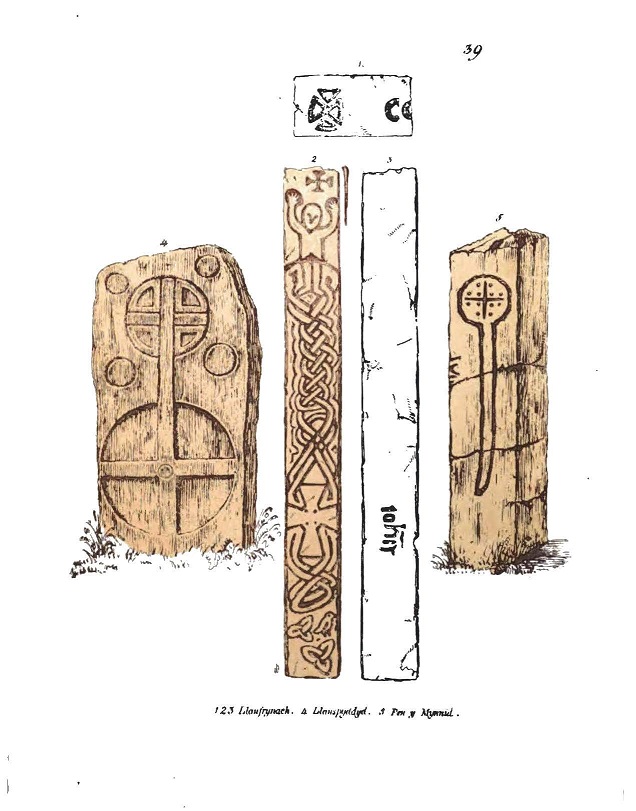
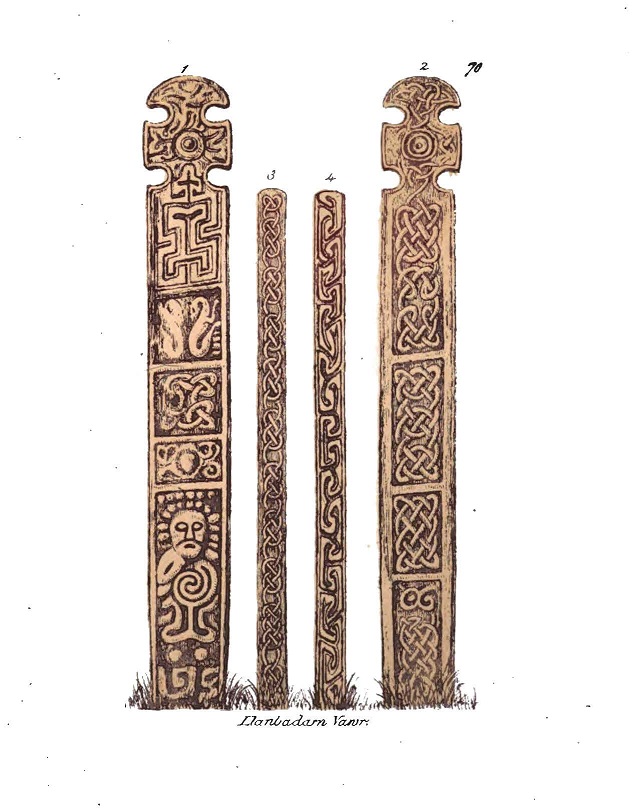
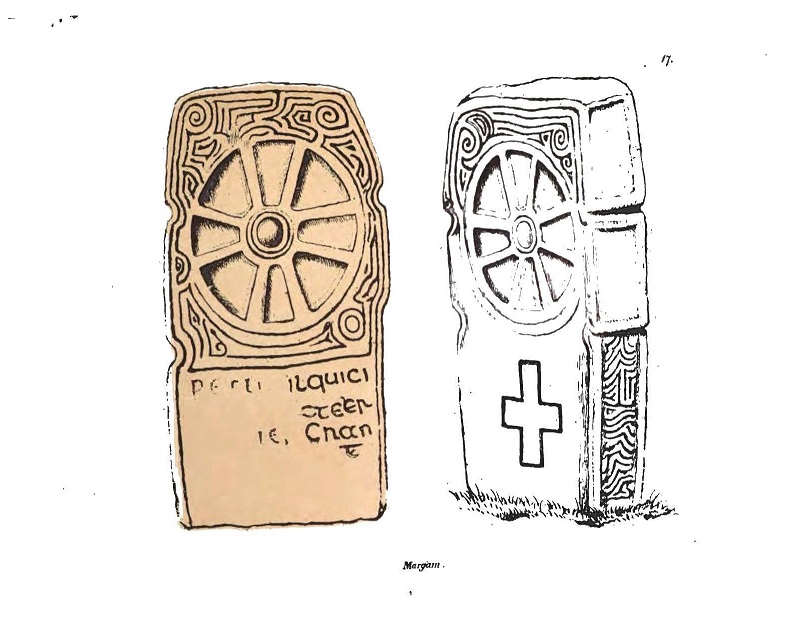
Not to me they don't.
DNA research done in the last few years of haplogroup R1b has shown that the Welsh are the only remnants of the original inhabitants of Britain and our DNA is genetically distinct from the rest of the UK. The DNA evidence proves that as a people we were never conquered as there is very little outside interaction with us. This means no roman, no Viking, no Saxon or Norman, no beaker people and certainly no lost tribe of Israel in their genetic makeup. Even the Welsh language is proof of not being conquered, if you can speak and read welsh then you would have no trouble understanding someone speaking Old Welsh from over a thousand years ago. How many other languages can you do this with?
So why do British archaeologists feel the need to invent groups of people to explain their research? Like the beaker people and other theoretical peoples? It feels like they don't believe the Welsh were capable of making the advances in technology that have been found in Britain.
At one time the lands of the Welsh covered the whole of Britain, from Scotland to Cornwall. There is evidence of the original people of the island; in what is now called Wales, stretching back over 40,000 years. The oldest human burial in the UK was found in wales. The Red Lady of Paviland is a skeleton found in the Gower area of Wales buried in a cave. The skeleton was originally thought to be a woman, because of the grave goods, but later tests have shown it was a man. It gets its name from the fact it was covered with red ochre before being buried. The skeleton was found with what has been identified as wands and bracelets of ivory, along with a mammoth’s skull. The goods suggest someone of status and probably some type of religious person, maybe a priest. Ornamentation on the grave goods has dated this burial to before the last period of glaciation, i.e. 25,000 BC. They were able to bury their dead within a religious context, with ornamented goods, yet they are not capable of making a beaker with a few lines on it?
So this is my attempt to unravel the lies fed to us by the archaeologists of Britain. starting with the stones of Wales.
All over the UK there are standing stones, stone circles, tombs and chambers. All attest to the knowledge and skill of the original inhabitants of this island. It stands to reason that if the original inhabitants of the island were the Welsh, then they made them, not some imaginary people who came from elsewhere.
Take Stonehenge as an example, one of the best feats of engineering undertaken by the ancient inhabitants of Britain. It is well known that the blue stones came from south wales. It is also thought that the stones were probably in use in Wales before being transported to their present site. Now British archaeology will have you believe that some mysterious people went to wales, took the stones and transported them across wales, across what is now England and erected them where they now stand, all without even the smallest reaction by the welsh they belonged to. Really? The Welsh just let them take stones that were so special to them they transported them across Britain to Stonehenge and erected them by hand? Complete rubbish. It would be like the French buying Stonehenge now and coming over and saying they were now going to take it down and transport it back to France. It wouldn't happen, and the stones mean nothing to us now.
Do you really think that the most violent and war ready tribes in the whole of Britain at that time would allow that to happen? The tribes of South Wales were so vicious and violent that they were never defeated in battle and the most powerful kings, princes and warlords in Britain came from this area. The romans only ever invaded north wales properly, they never dared to invade south wales, and they held the local tribe in the area I live, The Silures, with the highest respect because of their ferocity and were the only tribe named in their annals. They had small outposts and marching camps but nothing major further into south wales than Caerleon. The Vikings only attacked the south coast of what is now wales once, they were defeated. Not even the English kings with their powerful armies could defeat them, south wales was the only part of wales left to the Welsh princes to rule, as they were the only ones who could control the tribes living in the area. It costs less lives, money and time to assimilate than to conquer.
Yet you want me to believe the stones were taken without a fight? This only leaves the possibility that it was the Welsh who took them there. There are stone circles all over wales, I personally know of 31, not as big as Stonehenge, but they are there. So the welsh were building stone circles, yet they didn't build Stonehenge, with stones from Wales?
Now the standing stones across Britain are numerous, yet most of those found in wales are deemed to be Christian or roman in origin. I believe they are much older. The thing is, most were described during the end of the 19th century and the beginning of the 20th when everything was labeled Christian and the myths and legends of wales were romanticized so much they have no basis in reality. I have translated many welsh manuscripts and they bear no relation to what is published as the Mabinogion, they have been romanticized out of all proportion and bear no resemblance to the originals.
Just because a stone has a cross on it, doesn't mean it is Christian. The cross in Christianity didn't become associated with it until the 2nd century. It didn't come into widespread use until at least the 4th century, they thought it was abhorrent and symbolized pain and suffering. Crosses as decoration have been used for thousands of years. So how can stones that were around before the romans came to Britain be Christian?
Do any of these look anything like Christian?



Not to me they don't.
All over wales there are stones with carvings, yet all the books on the subject without fail say they are Christian if they have anything resembling a
cross on them. Even carvings of people who are standing with outstretched arms are classed as early representations of Jesus and therefore Christian.
There is nothing on these stones that even resembles Jesus.
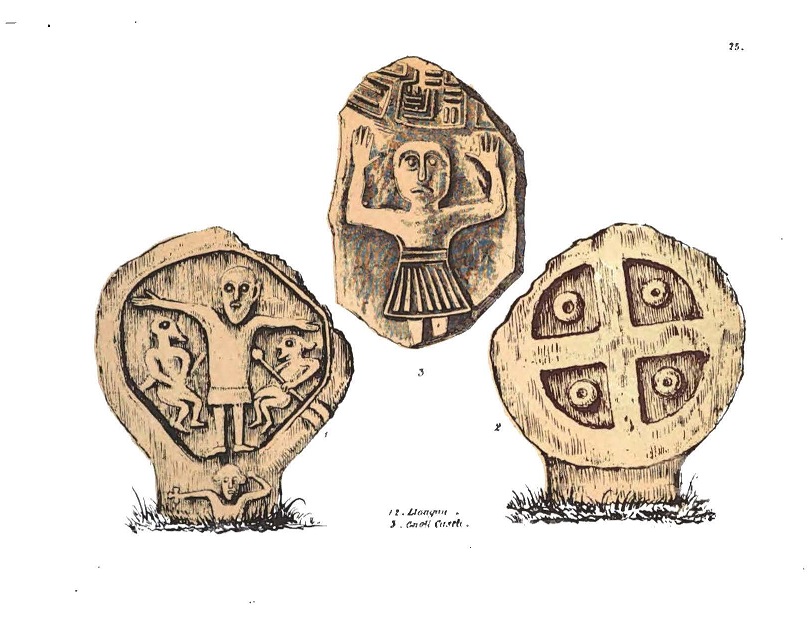
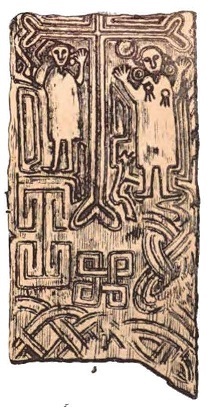

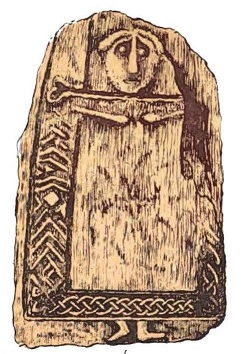
This one looks more like a Grey than Jesus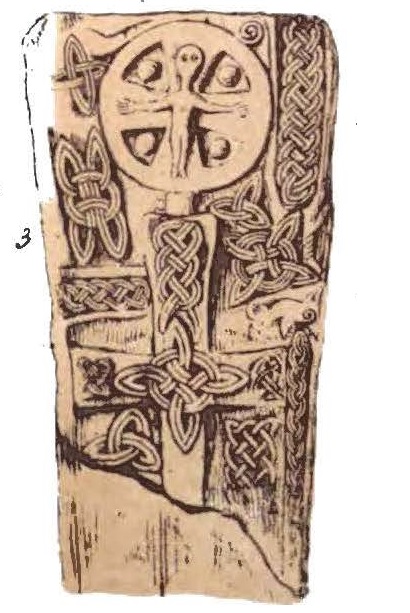
If you look at some of the stones they have Latin writing on them, these are deemed to be roman. Yet without fail the writing is always very poorly executed, but the other carvings on them are very intricate.
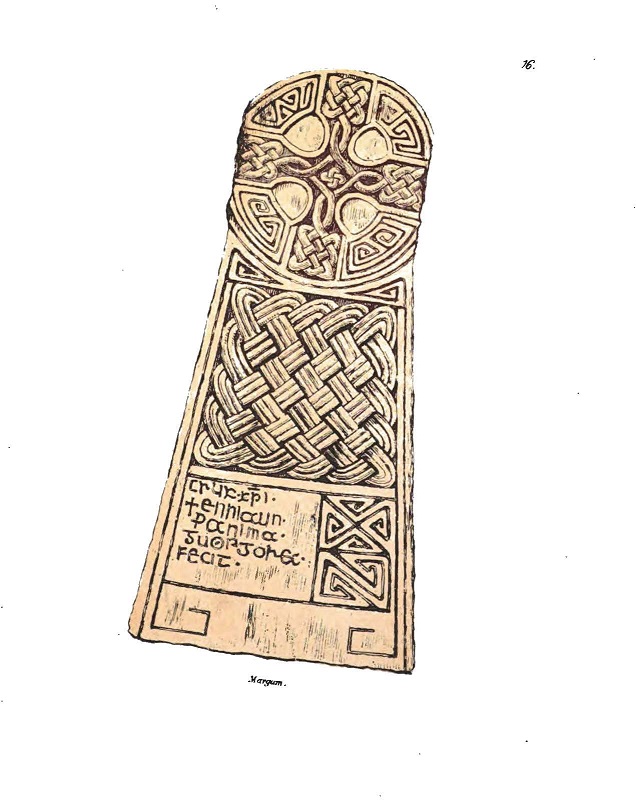
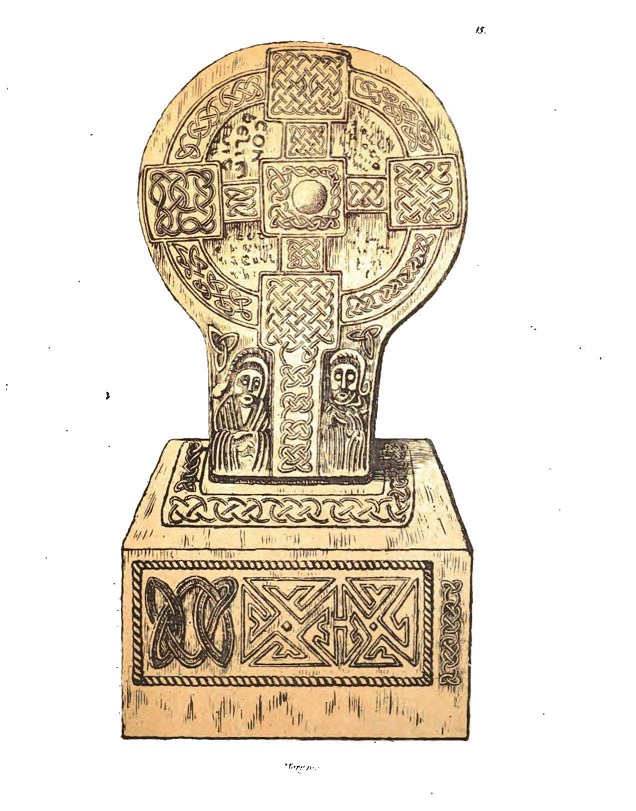
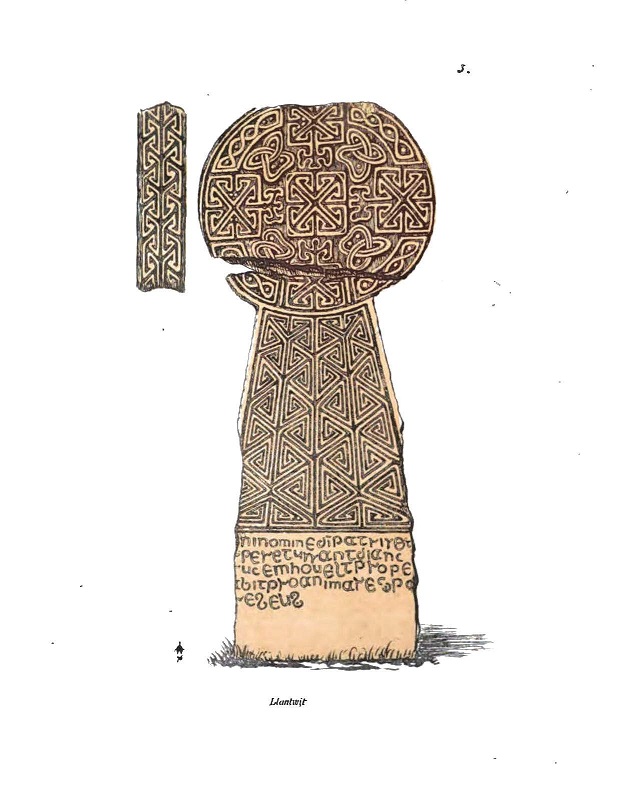
There are only two possibilities that can explain this. Firstly, whoever carved these outstanding monuments had the skill to carve intricate knot work, people, animals etc., yet couldn't carve words. Secondly, the writing was carved later. I can't think of any other reason for the differences. Archaeologists want you to believe that the carvers spent all that time, skill and effort carving these beautiful stones only to scrawl a name across it like a child. You can see just by looking at them that the writing just doesn't fit. I say they are nothing more than graffiti done by the romans, etc. Most of the inscriptions are burial epitaphs, which suggests most were reused when they buried their dead, killed fighting the Welsh. It is well known that the romans revered the British gods worshipped by the Briton tribes. They sacrificed to them and left inscriptions praising them. The number of altars which have been discovered, dedicated to GENIO LOCI, "To the divinity of the place," indicates, that, among the Romans there were those, who thought that good fortune could only be gained by a Roman sacrifice to a deity of the Britons. By reusing the ancient stones they found maybe they thought that the gods would watch over their deceased.




This one looks more like a Grey than Jesus

If you look at some of the stones they have Latin writing on them, these are deemed to be roman. Yet without fail the writing is always very poorly executed, but the other carvings on them are very intricate.



There are only two possibilities that can explain this. Firstly, whoever carved these outstanding monuments had the skill to carve intricate knot work, people, animals etc., yet couldn't carve words. Secondly, the writing was carved later. I can't think of any other reason for the differences. Archaeologists want you to believe that the carvers spent all that time, skill and effort carving these beautiful stones only to scrawl a name across it like a child. You can see just by looking at them that the writing just doesn't fit. I say they are nothing more than graffiti done by the romans, etc. Most of the inscriptions are burial epitaphs, which suggests most were reused when they buried their dead, killed fighting the Welsh. It is well known that the romans revered the British gods worshipped by the Briton tribes. They sacrificed to them and left inscriptions praising them. The number of altars which have been discovered, dedicated to GENIO LOCI, "To the divinity of the place," indicates, that, among the Romans there were those, who thought that good fortune could only be gained by a Roman sacrifice to a deity of the Britons. By reusing the ancient stones they found maybe they thought that the gods would watch over their deceased.
edit on 24-4-2014 by urbanghost because: (no reason given)
Ha, so the Picts and Gaels were not also the "original inhabitants of Britain"? Good luck proving that. You're no more British than any other Celtic
speaking group in the Isles. Your language (Brythonic) is simply a different branch of the Insular Celtic, along with Goidelic. It's likely that the
Picts also spoke a form of Brythonic.
This is just hyper-nationalist rhetoric with no facts to support it.
This is just hyper-nationalist rhetoric with no facts to support it.
edit on 24-4-2014 by Gallowglaich because: (no reason given)
a reply to: urbanghost
We have a similar story here in Australia regarding the Mungo Man and I found it interesting that the same red ochre was used in this burial also.
I guess another avenue you could take is whether the red ochre powder was in the region of your ancient ancestor... It's amazing how little things like that can paint a completely different picture about how the ancients interacted and lived.
We have a similar story here in Australia regarding the Mungo Man and I found it interesting that the same red ochre was used in this burial also.
60,000 year old skeletal remains in Australia
Other features indicating that the skeleton was of a male are the angle of the sciatic notch, a large femur head, and an estimated height of 170 cm (5 ft 7) compared to the estimated height of 148 cm (4 ft 10) for Mungo Woman. Another feature of this skeleton was the presence of a condition called woomera elbow or atlatl elbow, in the right elbow, that is, severe osteoarthritis believed to results from the action of throwing spears with a woomera for a number of years. This condition occurs only in the dominant spear throwing arm. This means that at 40,000 (or 60,000) years old, it is the earliest known use of a spear thrower.
Red ochre powder had been scattered over the body at the time of burial. The fact that ochre was used in the burial indicates that trade routes must have been operating even at this remote time, as there are no known sources of ochre for long distances around the burial site.
I guess another avenue you could take is whether the red ochre powder was in the region of your ancient ancestor... It's amazing how little things like that can paint a completely different picture about how the ancients interacted and lived.
originally posted by: Gallowglaich
Ha, so the Picts and Gaels were not also the "original inhabitants of Britain"? Good luck proving that. You're no more British than any other Celtic speaking group in the Isles. Your language (Brythonic) is simply a different branch of the Insular Celtic, along with Goidelic. It's likely that the Picts also spoke a form of Goidelic.
This is just hyper-nationalist rhetoric with no facts to support it. You are simply over-compensating for the fact that Wales is the smallest and most insignificant country in the Isles.
The picts came via Ireland and the Gaels also. That's why the Scots are Gaelic not Brythonic. The Picts never arrived until the first couple of centuries AD
edit on 24-4-2014 by urbanghost because: (no reason given)
edit on 24-4-2014 by urbanghost because: (no reason
given)
edit on 24-4-2014 by urbanghost because: (no reason given)
a reply to: DarknStormy
Yes Red Ochre is found in the region in great quantities. The skeleton was also buried with hundreds of seashells, not sure what the significance of this is
Yes Red Ochre is found in the region in great quantities. The skeleton was also buried with hundreds of seashells, not sure what the significance of this is
originally posted by: urbanghost
a reply to: DarknStormy
Yes Red Ochre is found in the region in great quantities. The skeleton was also buried with hundreds of seashells, not sure what the significance of this is
Serious?
At Lake Mungo the imprints of shafts are the earliest known evidence of the use of wooden projectile technologies that date to about 25,000 years ago (Webb et al., 2006). Also at Lake Mungo, as well as other sites such as Riwi, dating from 36,000 to 40,000 years ago, is the first known evidence of long-distance social interaction or exchange, examples being marine shells, shell beads and ochre that were transported for distances of more than 200-300 km (Allen, 1972; Balme, 2000; Balme & Morse, 2006).
It has been shown by conjoining flakes onto horsehoof cores that prior to 40,000 years ago at Lake Mungo blades had been removed from the site (Shawcross, 1998).
That is interesting...
originally posted by: urbanghost
originally posted by: Gallowglaich
Ha, so the Picts and Gaels were not also the "original inhabitants of Britain"? Good luck proving that. You're no more British than any other Celtic speaking group in the Isles. Your language (Brythonic) is simply a different branch of the Insular Celtic, along with Goidelic. It's likely that the Picts also spoke a form of Goidelic.
This is just hyper-nationalist rhetoric with no facts to support it. You are simply over-compensating for the fact that Wales is the smallest and most insignificant country in the Isles.
The picts came from Ireland and the Gaels also. That's why they are Gaelic not Brythonic.
Picts were not Gaelic, only the Scotti, or the inhabitants of Dal Riada and the Western Isles of Scotland were Gaelic. It is speculated that the Picts spoke a Brythonic tongue similar to Welsh and the language spoken in Ystard Clud in Southwestern Scotland. Unfortunately though the Pictish language is lost to us.
Picts and Gaels are just as native to the Isles as the Britons.
a reply to: Gallowglaich
According to the welsh legends they came from Ireland and the Cymric fought against them the whole time they were here.
According to the welsh legends they came from Ireland and the Cymric fought against them the whole time they were here.
a reply to: urbanghost
If the Welsh were so formidable and unbeatable.... how come us English kicked your backsides and subjugated you into the UK?
If the Welsh were so formidable and unbeatable.... how come us English kicked your backsides and subjugated you into the UK?
a reply to: PheonixReborn
You didn't. Only North Wales not in South Wales. This is shown in the Welsh language, north Wales Welsh is different to South Wales Welsh. Welsh in the South is an older language and closer related to Old Welsh than that spoken in the North. The English kings couldn't control the South Wales tribes so gave the land to the Welsh princes to govern. The princes took on the Norman ways but still governed with Welsh laws. Laws that were later used in England, succession by the oldest son being one of them. This is in the history books. That's not kicking our backsides.
You didn't. Only North Wales not in South Wales. This is shown in the Welsh language, north Wales Welsh is different to South Wales Welsh. Welsh in the South is an older language and closer related to Old Welsh than that spoken in the North. The English kings couldn't control the South Wales tribes so gave the land to the Welsh princes to govern. The princes took on the Norman ways but still governed with Welsh laws. Laws that were later used in England, succession by the oldest son being one of them. This is in the history books. That's not kicking our backsides.
edit on 24-4-2014 by urbanghost because: (no reason given)
edit on 24-4-2014 by urbanghost because: (no reason given)
a reply to: urbanghost
Shells often have a layer of swirled, colourful material on their insides. They are also quite beautiful. Many ancient religions used them across the world, for various things. Attached to a staff they would rattle imposingly, held to the ear, it is said that one can hear the sea in them, which to ancient man must have been something magical in aspect (when of course, today we understand that effect to be caused by the passage of air through the shell, rather than the captured sound of the sea, imbued into the object by the power of arcane ritual, or the will of sea spirits). They were probably valued to a degree, purely for their appearance if nothing else.
That may explain why they are found in unlikely places, away from sea side locales.
Regarding the status of Wales and its people previous to and during the Roman (spits loudly in the direction of Rome) occupation of Britain, and subsequent embuggerments applied to the Welsh since then, I think that because of the Roman invasion, and the subjugation of the Welsh over hundreds of years, that there is no way to know if what you say is true. What I would say, is that I am proud of my Welsh roots, and mortified that I never learned the language. I do not live in Wales, indeed, I was born in Essex, and have lived there my whole life.
But there is no landscape, no terrain, no patch of earth or stone that I love more than Snowdonia national park, and no sensation that I have ever enjoyed more, than clinging to the side of Snowdon, with the wind and rain trying to steal me from its side, with no safety gear what so ever, and no experience, climbing in a straight shot to the top. I ignored all the walking routes!
That is the only time I have felt like I was where I should be.
Shells often have a layer of swirled, colourful material on their insides. They are also quite beautiful. Many ancient religions used them across the world, for various things. Attached to a staff they would rattle imposingly, held to the ear, it is said that one can hear the sea in them, which to ancient man must have been something magical in aspect (when of course, today we understand that effect to be caused by the passage of air through the shell, rather than the captured sound of the sea, imbued into the object by the power of arcane ritual, or the will of sea spirits). They were probably valued to a degree, purely for their appearance if nothing else.
That may explain why they are found in unlikely places, away from sea side locales.
Regarding the status of Wales and its people previous to and during the Roman (spits loudly in the direction of Rome) occupation of Britain, and subsequent embuggerments applied to the Welsh since then, I think that because of the Roman invasion, and the subjugation of the Welsh over hundreds of years, that there is no way to know if what you say is true. What I would say, is that I am proud of my Welsh roots, and mortified that I never learned the language. I do not live in Wales, indeed, I was born in Essex, and have lived there my whole life.
But there is no landscape, no terrain, no patch of earth or stone that I love more than Snowdonia national park, and no sensation that I have ever enjoyed more, than clinging to the side of Snowdon, with the wind and rain trying to steal me from its side, with no safety gear what so ever, and no experience, climbing in a straight shot to the top. I ignored all the walking routes!
That is the only time I have felt like I was where I should be.
originally posted by: urbanghost
a reply to: Gallowglaich
According to the welsh legends they came from Ireland and the Cymric fought against them the whole time they were here.
Maybe, but that's just a legend. Also, if anything the Irish are more native than the Welsh, because they weren't as affected by continental migrations like the Bell Beaker culture and the Neolithic expansion.
So saying that the Welsh are "the most native" to the Isles is really baseless and false.
edit on 24-4-2014 by Gallowglaich because: (no reason
given)
a reply to: Gallowglaich
So why does the DNA research show just this? Or is that wrong?
It may be only a legend, but that's all you have to go on. Apart from the Irish nobody else wrote about them. The Irish legends are the same as the Welsh regarding them.
So why does the DNA research show just this? Or is that wrong?
It may be only a legend, but that's all you have to go on. Apart from the Irish nobody else wrote about them. The Irish legends are the same as the Welsh regarding them.
edit on 24-4-2014 by urbanghost because: (no reason given)
originally posted by: urbanghost
a reply to: Gallowglaich
So why does the DNA research show just this? Or is that wrong?
It may be only a legend, but that's all you have to go on. Apart from the Irish nobody else wrote about them. The Irish legends are the same as the Welsh regarding them.
What exactly does the DNA research show? That the Welsh are genetically distinct from the Irish, Scottish, And English?
Of course they are, because they are a separate country with a separate population. Those DNA studies don't show that the Welsh are "more native", that's just your interpretation. My interpretation is that the Welsh are most closely related to the pre-Roman Britons, who are no more native than their Northern or Western cousins.
No population on earth is truly native, to think so would be naive. Every population has been subject to migrations and assimilation by other groups. The Welsh were not magically unaffected by the Neolithic migrants or the other incursions from the continent.
The Irish probably most closely resemble the original Upper Paleolithic inhabitants of the Isles, the Cro-magnon stock, so if anyone is "more native", it's the Irish, since they are farther from the continent and have always been more isolated.
edit on 24-4-2014 by Gallowglaich because: (no
reason given)
edit on 24-4-2014 by Gallowglaich because: (no reason given)
a reply to: urbanghost
Well I know that shells were used as currency by some ancient tribes. Perhaps these periwinkles were used in some analogue of the coin for the ferryman, or more likely to placate the deity responsible for the souls of the dead, if indeed philosophy had evolved to that point, or in that direction amongst the ancient Welsh.
Well I know that shells were used as currency by some ancient tribes. Perhaps these periwinkles were used in some analogue of the coin for the ferryman, or more likely to placate the deity responsible for the souls of the dead, if indeed philosophy had evolved to that point, or in that direction amongst the ancient Welsh.
OP, you've taught me some things I certainly didn't know. thank you. threads like this are what keeps me coming to ats to learn and learn anew. Nice
work.
a reply to: Gallowglaich
The Irish have never been isolated, show me the evidence that proves they have.
I am not disputing anything about Ireland. The Irish are not on the island of Britain and the Welsh are not on Ireland, so it is a bit irrelevant anyway. I am talking about where the Welsh were not the Irish.
Welsh Dna 1
welsh dna 2
The Irish have never been isolated, show me the evidence that proves they have.
I am not disputing anything about Ireland. The Irish are not on the island of Britain and the Welsh are not on Ireland, so it is a bit irrelevant anyway. I am talking about where the Welsh were not the Irish.
Welsh Dna 1
welsh dna 2
new topics
-
Just Came Across These Unusual Old UFO Pics
Aliens and UFOs: 41 minutes ago -
LA Mayor Bass Demanded $49M in Additional LAFD Cuts One Week Before Wildfires
Mainstream News: 2 hours ago -
Sepultura - Territory - With New Drummer Greyson Nekrutman
Music: 3 hours ago -
Carry On!
Short Stories: 3 hours ago -
This should be plastered all over the airwaves
Mainstream News: 9 hours ago -
Oh, Good Gosh. “Kremlin Warns Stay Away from Greenland.”
World War Three: 11 hours ago -
Archbisop Vigano Warns of Deep State and Deep Church
New World Order: 11 hours ago
top topics
-
This should be plastered all over the airwaves
Mainstream News: 9 hours ago, 21 flags -
Archbisop Vigano Warns of Deep State and Deep Church
New World Order: 11 hours ago, 15 flags -
LA Mayor Bass Demanded $49M in Additional LAFD Cuts One Week Before Wildfires
Mainstream News: 2 hours ago, 13 flags -
Oh, Good Gosh. “Kremlin Warns Stay Away from Greenland.”
World War Three: 11 hours ago, 11 flags -
A Flash of Beauty: Bigfoot Revealed ( documentary )
Cryptozoology: 17 hours ago, 8 flags -
Carry On!
Short Stories: 3 hours ago, 2 flags -
Just Came Across These Unusual Old UFO Pics
Aliens and UFOs: 41 minutes ago, 2 flags -
Sepultura - Territory - With New Drummer Greyson Nekrutman
Music: 3 hours ago, 1 flags
active topics
-
LA Mayor Bass Demanded $49M in Additional LAFD Cuts One Week Before Wildfires
Mainstream News • 13 • : DAVID64 -
This should be plastered all over the airwaves
Mainstream News • 52 • : fringeofthefringe -
Just Came Across These Unusual Old UFO Pics
Aliens and UFOs • 1 • : gort69 -
Los Angeles brush fires latest: 2 blazes threaten structures, prompt evacuations
Mainstream News • 349 • : AlroyFarms -
Mood Music Part VI
Music • 3782 • : lilzazz -
Judge rules president-elect Donald Trump must be sentenced in 'hush money' trial
US Political Madness • 117 • : WeMustCare -
Dr. Demento
Music • 15 • : GotterDameron23 -
Trump says ownership of Greenland 'is an absolute necessity'
Other Current Events • 158 • : matafuchs -
Archbisop Vigano Warns of Deep State and Deep Church
New World Order • 8 • : DontTreadOnMe -
A Flash of Beauty: Bigfoot Revealed ( documentary )
Cryptozoology • 7 • : ColeYounger2
